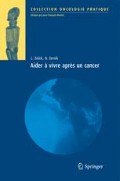Résumé
La qualité de vie ne s’envisage plus aujourd’hui sans la qualité de la vie sexuelle. La sexualité, c’est l’ensemble des affects, fantasmes et comportements liés á la jouissance du corps de l’autre et/ou du sien propre1. Aider un(une) patient(e) á revivre aprés un cancer, c’est aussi l’aider á retrouver une sexualité satisfaisante. Encore aujourd’hui, la sexualité reste un domaine délicat á aborder, par les patients qui sont, d’une part, souvent gênés, craignant d’importuner. D’autre part, si le médecin se sent capable de «gérer» les problémes somatiques, il a souvent plus de mal á faire face aisément á cet «autre» probléme du corps qu’est la sexualité de ses patients et met volontiers en place, selon l’expression consacrée, des «stratégies d’évitement» qui le protégent.
Selon A. Comte-Sponville.
Preview
Unable to display preview. Download preview PDF.
Références
Katz A (2005) The sounds of silence: sexuality information for cancer patients. J Clin Oncol 23: 238–41
This P (2002) Sexualité aprés cancer du sein, quel rôle pour le clinicien? Oncologie 4: 75–9
Poinsot R, Brédart A, This P, et al. (2005) Impact sur la qualité de vie et la sexualité du traitement hormonal chez les patientes atteintes d’un cancer du sein. Rev Fr Psycho Oncol 4: 161–9
Andersen BL, Carpenter KM, Yang HC, et al. (2007) Sexual well-being among partenered women with breast cancer recurrence. J Clin Oncol 21: 3151–7
Ganz PA (1997) Sexual functionning after breast cancer: a conceptual framework for future studies. Ann Oncol 8: 105–7
Laumann E, Paik A, Rosen R (1999) Sexual dysfunction in the United-States. Prevalence and predictors. JAMA 281: 537–44
Tessler Lindau S, Schumm P, Laumann EO, et al. (2007) A study of sexuality and health among older adults in the United States. N Engl J Med 357: 762–74
Ganz PA, Rowland JH, Desmond K, et al. (1998) Life after breast cancer: understanding women’s health-related quality of life and sexual functioning. J Clin Oncol 16: 501–14
Ganz PA, Desmond KA, Belin TR, et al. (1999) Predictors of sexual health in women after a breast cancer diagnosis. J Clin Oncol 17: 2371–80
Schover L, Yetman R, Tuason L, et al. (1995) Partial mastectomy and breast reconstruction. Cancer 75: 54–64
Malinovszky KM, Gould A, Foster E, et al. (2006) Quality of life and sexual function after high-dose or conventional chemotherapy for high-risk breast cancer. Br J Cancer 95: 1626–31
Burwell SR, Case LD, Kaelin C, et al. (2006) Sexual problems in younger women after breast cancer surgery. J Clin Oncol 24: 2815–21
Fobair P, Stewart SL, Chang S, et al. (2006) Body image and sexual problems in young women with breast cancer. Psycho-Oncol 15: 579–94
Avis NE, Crawford S, Manuel J (2004) Psychosocial problems among younger women with breast cancer. Psycho-Oncol 13: 295–308
Rowland JH, Desmond KA, Meyerowitz BE, et al. (2000) Role of breast reconstructive surgery in physical and emotional outcomes among breast cancer survivors. J Natl Cancer Inst 92: 1422–9
Fallowfield L, Fleissig A, Edwards R, et al. (2001) Tamoxifen for the prevention of breast cancer: psychosocial impact on women participating in two randomized controlled trials. J Clin Oncol 19: 1885–92
Berglund G, Nystedt M, Bolund C, et al. (2001) Effect of endocrine treatment on sexuality in premenopausal breast cancer patients: a prospective randomized study. J Clin Oncol 19: 2788–96
Dorval M, Guay S, Mondor M, et al. (2005) Couples who get closer after breast cancer: frequency and predictors in a prospective investigation. J Clin Oncol 23: 3588–96
Ganz PA, Greendale GA, Petersen L, et al. (2000) Managing menopausal symptoms in breast cancer survivors: results of a randomized controlled trial. J Natl Cancer Inst 92: 1054–64
Lachowsky M, Winaver D (2007) Aspects psychosomatiques de la consultation en gynécologie. Masson, Paris. p 273–88
Lachowsky M. Sexualité aprés cancer pelvien (2004) Lettre Gynécol 297: 8–9
Schover LR, Fife M, Gershenson DM (1989) Sexual dysfunction and treatment for early stage cervical cancer. Cancer 63: 204–12
Frumovitz M, Sun CC, Schover LR, et al. (2005) Quality or life and sexual functionning in cervical cancer survivors. J Clin Oncol 23: 7428–36
Donovan KA, Taliaferro LA, Alvarez EM, et al. (2007) Sexual health in women treated for cervical cancer: characteristics and correlates. Gynecol Oncol 104: 428–34
Bergmark K, Avall-Lundkvist E, Dickman PW, et al. (1999) Vaginal changes and sexuality in women with a history of cervical cancer. N Engl J Med 340: 1383–9
Jensen PT, Groenvold M, Klee MC, et al. (2004) Early-Stage cervical carcinoma, radical hysterectomy, and sexual function a longitudinal study. Cancer 100: 97–106
Robinson JW, Psych C, Faris PD, et al. (1999) Psychoeducational group increases vaginal dilation for younger women and reduces sexual fears for women of all ages with gynecological carcinoma treated with radiotherapy. Int J Radiation Oncology Biol Phys 44: 497–506
Juraskova I, Butow P, Robertson R, et al. (2003) Post-treatment sexual adjustment following cervical and endometrial cancer: a qualitative insight. Psycho-Oncology 12: 267–79
Yazbeck C (2004) La fonction érotique aprés hystérectomie. Gynecol Obstet Fertil 32: 49–54
Cachelou R (1999) Problémes psycho sexuels aprés cancers gynécologiques. In: Mimoun S (ed) Traité de gynécologie obstétrique psychosomatique. Flammarion, Paris, p 192–4
Author information
Authors and Affiliations
Rights and permissions
Copyright information
© 2010 Springer-Verlag France
About this chapter
Cite this chapter
This, P., Lachowsky, M. (2010). La vie sexuelle. In: Aider á vivre aprés un cancer. Oncologie pratique. Springer, Paris. https://doi.org/10.1007/978-2-287-79501-5_19
Download citation
DOI: https://doi.org/10.1007/978-2-287-79501-5_19
Publisher Name: Springer, Paris
Print ISBN: 978-2-287-79500-8
Online ISBN: 978-2-287-79501-5

